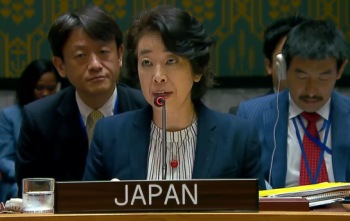Statement by H.E. Ambassador SHINO Mitsuko, Chargé d’Affaires, Deputy Permanent Representative of Japan to the United Nations, at the United Nations Security Council Briefing on the Situation in Haiti
2024/7/3

(as delivered)
Thank you, Mr. President.
I appreciate SRSG Ms. Salvador's insightful briefing. I welcome the interim Prime Minister of Haiti, Dr. Garry Conille, and Foreign Minister of the Dominican Republic, Mr. Alvarez as well as the representatives of Canada, Saint Kitts and Navis, and Kenya.
We welcome the installation of interim Prime Minister Conille’s cabinet and his strong political will to form a new elected government in the near future through the appointment of a new Provisional Electoral Council. We take positive note of the efforts of the Transitional Presidential Council so far, as well as supportive regional engagement by the CARICOM.
To advance a successful political transition process, inclusiveness for all Haitian people is key, as they are the agents to restore their democratic institutions and the rule of law. Japan calls upon all Haitian stakeholders to join the process and promote inclusive dialogue.
Despite these positive developments, forward-looking progress has been hindered by continued gang attacks, which are driving the Haitian people into vulnerable situations. We strongly condemn the gang violence and actions taken in support of the gangs.
Japan welcomes the dispatch of the first batch of personnel for the Multinational Security Support (MSS) Mission, as requested by Haiti. We express warm appreciation to Kenya and all the contributing countries. Japan again calls on the international community to redouble its assistance to the Mission. We will make our best efforts to support the Mission’s mandate.
We reiterate that continuous close coordination among all stakeholders including the Haitian National Police (HNP) is fundamental to the MSS Mission’s effective engagement. In particular, the Mission should establish strong communication and coordinating lines with BINUH and the UN Haiti sanctions regime, including for communicating relevant security information gained through the MSS Mission’s activities. Such coordination and collaboration will create synergy among the activities of the various actors on the ground, achieving maximum efficiency for sustainable security in Haiti.
Addressing security alone is not sufficient. It should go hand in hand with Haitian efforts to tackle the interwinding root causes from a medium- and long-term perspective, building resilience in order to prevent a relapse into crisis and ensure sustainable stability in Haiti and the CARICOM region. To assist such Haitian efforts, a comprehensive approach ensuring the Humanitarian-Development-Peace nexus is needed. At the same time, security and safety are required to provide assistance for fostering social and economic development. In this vein, I reiterate that the UN Peacebuilding Architecture can help Haiti’s security become sustainable. In particular, the Peacebuilding Commission can help make the international community’s approach more comprehensive through its bridging, convening, and catalytic roles within and beyond the UN system.
BINUH has played a significant role in supporting Haitian-led, Haitian-owned efforts. Japan supports the extension of its mandate and will constructively engage in negotiations to allow it to continue its work effectively, including the advisory role of BINUH to the Government of Haiti, taking the latest political and security situation into account. Japan will also actively engage in the discussion towards more effective sanctions.
In conclusion, Japan assures its commitment to supporting Haiti and its people, together with the Council members here as well as all relevant partners.
I thank you.
